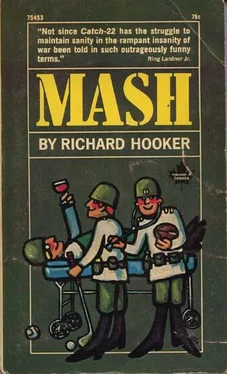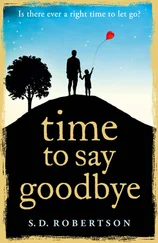“Henry,” said Hawkeye, “for Crissake, sit down and relax. Nobody needs guys like him. You’re all concerned with numbers of people. The clown created more work than he accomplished. We’re better off without him.”
“Maybe so,” Henry sighed. “I don’t know.”
“Henry,” Duke asked, “if I get into Hot Lips and jump Hawkeye Pierce can I go home, too?”
Each doctor’s tent at the MASH had a young Korean to clean it, keep the stove going, shine shoes, and do the laundry and other chores. He was called a houseboy.
Naturally The Swamp’s houseboy was called a Swampboy. His name was Ho-Jon. Ho-Jon was tall for a Korean. He was thin. He was bright. Prior to the war he had attended a church school in Seoul. He was a Christian. His English was relatively fluent.
Ho-Jon thought Hawkeye Pierce, Duke Forrest and Trapper John Mclntyre were the three greatest people in the world. Unlike other houseboys, he was allowed to spend a lot of his spare time in the tent. The Swampmen helped him with reading and writing English, had books sent to him from the States, and gave him a good basic education in a few short months. Ho-Jon had a mind like a bear trap. It engulfed everything that came its way. During bull sessions in The Swamp, he sat quietly in a corner and listened. During busy periods, he was brought to the OR and trained to assist the Swampmen as a scrub nurse.
The Swampmen thought as much of Ho-Jon as he did of them. On his seventeenth birthday, however, despite the attempt of Colonel Blake, urged on by the Swampmen, to intercede with the Korean government, Ho-Jon was drafted into the Republic of Korea Army. Unhappiness and a feeling of despair and frustration prevailed in The Swamp on the day of Ho-Jon’s departure. The Swampmen gave him clothes, money, canned food, and cigarettes. Hawkeye himself drove Ho-Jon to Seoul. There the two went to see Ho-Jon’s family who lived in a dirty shack on a filthy street and whose reaction to the largesse showered upon their son by the American doctors was awe-inspiring and pathetic.
Hawkeye left hastily. He found an Air Force Officers’ club where he drank moodily and disinterestedly without getting any emotional benefit from the good Air Force Scotch. He never expected to see Ho-Jon again. He thought of Crabapple Cove and wondered how he could ever have thought his material benefits and opportunities limited. Compared to Ho-Jon, he’d had everything.
As it turned out, Captain Pierce did see Ho-Jon again. It was six weeks later, when Ho-Jon returned in the uniform of a private in the ROK Army. The uniform was covered with blood. Deep in Ho-Jon’s chest was a mortar fragment.
At the Double Natural, as at every MASH, all wounds were first hastily assessed in the admitting ward and then the seriously wounded were brought into the preoperative ward. There blood was typed, nurses and corpsmen took blood pressures, started transfusions, inserted Foley catheters in bladders and Levin tubes in stomachs, and hung the X-rays on a wire in front of each patient’s cot.
Arriving for duty on this morning and finding the preop ward full, Hawkeye, Duke and Trapper John had gone down the row of wounded and started to make their plans. When they reached the last cot a corpsman said, “This kid is pretty bad.”
Hawkeye looked at the X-ray. He saw a large shell fragment deep in the boy’s chest.
“This one’s for you, Trapper,” he said. “I’ll help you, and Duke can take that belly back there.”
Then Captain Pierce took his first look at the patient.
“Christ!” he said. “It’s Ho-Jon.”
Trapper looked.
“OK. It’s Ho-Jon. We’ll fix him.”
Ho-Jon opened his eyes. He saw his friends and smiled.
“You’ll be OK, boy,” said the corpsman.
“I know,” Ho-Jon whispered. “Captains Pierces and Captains Mclntyres will help me.”
“You know it, Ho-Jon,” Captain Pierce said. “You just rest, and we’ll do it after you’ve had one more pint of blood.”
The Duke was about to become occupied in a bad belly, so they decided not to tell him. They went out for a butt.
“How do we go, Trapper?” asked Hawkeye.
“Right chest, just like the missile. He’s lost some blood. I’m afraid it’s hit more than just the lung. It’s in deep.”
“Trapper, you remember how we used to wonder what a kid like Ho-Jon might do if he had a chance to get an education?”
“Yeah,” Trapper answered dully.
“If we squeeze him through, I’m going to get him into Androscoggin College.”
“We’ll squeeze him through and right into Dartmouth,” said Trapper, grinding out his cigarette. “If all he wants to do is catch lobsters, he can learn that here.”
A grim pair of surgeons went to work on Ho-Jon.
“We’ll need room,” said Trapper. “The sixth rib goes.”
“Never mind the conversation. Do it, Dad.”
They opened the pleura, put in the rib spreader, and aspirated the blood from the chest cavity. Ho-Jon’s pulse and blood pressure held steady. Trapper reached down toward the inferior vena cava where it empties into the right atrium of the heart. He felt the missile.
“I got it,” he said. “Here, feel.”
Hawkeye felt.
“I don’t feel anything.”
“Oh, Jesus,” moaned Trapper, and felt again.
“What happened?”
“The mother must have gone in. I can’t feel it.”
“I don’t get it,” said Hawkeye nervously.
“It must have been in the cava, and the hole sealed itself off. When I felt it I must have jiggled it just enough to turn it loose. I can’t feel it in the heart. I don’t feel it in the right pulmonary artery. It must be in the left pulmonary artery.”
“Whadda we do?”
“Close and get an X-ray and fight another day.”
“OK,” Hawkeye said unhappily.
The X-ray confirmed Trapper’s guess. The shell fragment was in the left pulmonary artery. Three days later Ho-Jon was out of bed, happy, proud to have been operated on by two of his three heroes and, unaware of the odds against him, not at all upset at the prospect of further surgery.
Taking a missile out of a pulmonary artery is no great trick, but few surgeons in Korea were familiar with such techniques. Cardiovascular surgery was in its infancy, and such procedures were not usually done in tents. Ordinarily this sort of case would have been evacuated to Tokyo, but no one seriously thought that any other surgeon in the Far East was better equipped to do the job than Trapper John. Colonel Blake did mention the possibility of evacuation once, but dropped the subject when Hawkeye gave him a very direct look.
In The Swamp the next week the tension grew. Humor was nonexistent. Unmilitary behavior tapered off. One evening Hawkeye passed around a bottle of Scotch, feeling that, for the sake of efficiency, they should attempt some sort of comeback.
“When do we go for it, Trapper?” he asked.
“June 2.”
“Why June 2?”
“That’s the day I shut out Harvard on two hits.”
Trapper John did not say another word that night. He lay on his sack, sipped his drink and just looked straight up.
Ho-Jon, at the start of his big day, lay on the operating table, expectantly but confidently gazing up at Ugly John. Ugly John said, “Now, Ho-Jon, you just take it easy. Everything will be all right.”
Ho-Jon smiled and said, “I know, Captains Blacks.”
Ugly John started the Pentothal and curare, and three minutes later inserted the intratracheal tube through which Ho-Jon would do all his breathing while his friends worked on him. Then Ho-Jon was turned onto his right side and draped, and Trapper John, assisted by Hawkeye and Duke, removed Ho-Jon’s fifth rib. With that out of the way, Trapper entered the pleural cavity, and easily located the missile wedged in the left pulmonary artery. After opening the pericardium, which surrounds the heart, he then dissected his way around the origin of the artery and placed umbilical tapes as temporary ties above and below the missile.
Читать дальше












